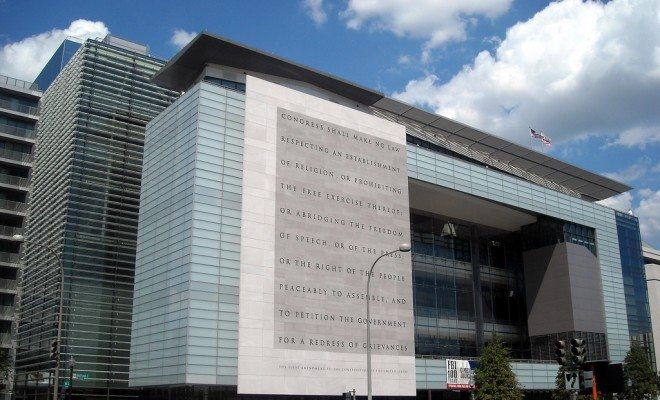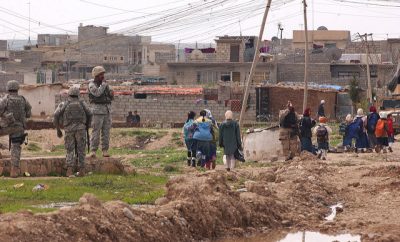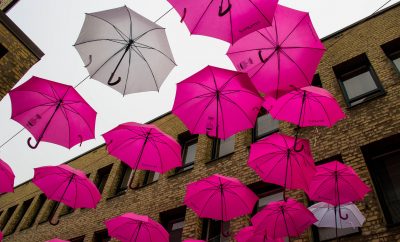 Image courtesy of [Josh via Flickr]
Image courtesy of [Josh via Flickr]
News
#WithoutNews: Newseum Raises Awareness of Fallen Journalists
Journalism can be an incredibly dangerous field. Last year 61 journalists were killed while covering topics such as war, crime, human rights, and politics. Everyday, journalists put themselves in danger to get the hard truth so that people can be informed of what is occurring in our world. As a result, campaigns such as A Day Without News were created to draw attention to the importance of journalism and those journalists that risk their lives on a daily basis.
The Newseum in Washington, DC put on a ceremony this morning recognizing 14 journalists who have died covering the news in 2014. For the first time in the Newseum’s history, no newspapers will be displayed in the “Today’s Front Pages” exhibit inside or outside of the building, or on its website. Instead, there are blacked-out pages featuring the hashtag #WithoutNews.
A world #WithoutNews would also leave us without knowledge, insight, and an understanding of how we are cogs in a greater machine @Newseum
— Kamahl Santamaria (@KamahlAJE) June 8, 2015
These 14 journalists have been selected to represent those who died in 2014, and will be placed among the other names on the memorial for fallen journalists. The “Today’s Front Pages” exhibit reaches more than 800,000 people who visit the Newseum annually. Through the museum’s website and mobile app, more than three million users visit “Today’s Front Pages” online every year. Displaying blacked-out front pages is a smart way to attract people’s attention and raise awareness of the increasing dangers of journalism. Peter S. Pritchard, chairman and CEO of the Newseum stated:
Part of our mission is to educate people about growing threats to journalists around the world. These blacked-out front pages vividly demonstrate what it means when journalists are murdered or kidnapped — we receive no news from some regions of the world. We hope the #WithoutNews campaign will encourage people to think about where news comes from, and to remember the brave men and women who often risk their lives to report it.
Newseum ceremony. Image courtesy of Angel Idowu.
One of these featured journalists is Michael Du Cille, a photojournalist for the Washington Post. Featured in the ceremony was a short summary honoring his life and work:
Despite the risks, Washington Post photographer Michael du Cille made three trips to Liberia in four months to photograph victims of the deadly Ebola virus. While hiking back from a remote village, du Cille collapsed from an apparent heart attack and was transported two hours across dirt roads to a hospital, where he was declared dead. He was 58. A three-time winner of the Pulitzer Prize for his powerful images, du Cille became the Post’s director of photography in 2007. But his passion for reporting drew him back into the field to cover dangerous assignments such as the war in Afghanistan, where he came under fire in 2013. The Ebola outbreak in West Africa has claimed the lives of more than 10,000 people.
The atmosphere was heavy, but I had the opportunity to speak with colleagues who worked with du Cille and spoke about the difference he worked to make.
“Michael was was so incredibly inspiring,” said Sari Horwitz, a staff writer for the Washington Post. “He was so dedicated to the work, it’s so sad to see a person so passionate about their work gone.”
It was easy to feel surprise and frustration for the lack of attention this campaign seemed to be receiving from the media, in comparison to the influx of other topics in the news, such as celebrity gossip.
Horowitz’s comments echoed that frustration, claiming Du Cille and all of the other fallen journalists were the true heroes. She stated:
What’s so crazy about this is that these are the true heroes, and no one even knows their name. They sacrifice their lives every day to get the story out, but it’s still so sad to see his name be added to the list of fallen journalists here in the Newsuem.
The other thirteen journalists that were honored at today’s event include: Yusuf Ahmed Abukar of Radio Ergo and Mustaqbal Radio who died in Somalia; Muftah Bu Zeid of Brnieq who died in Libya; Simone Camilli of the Associated Press who died in Israel; James Foley, a freelancer who died in Syria; Rubylita Garcia of Remate and dwAD who died in the Philippines; Nils Horner of Sveriges Radio who died in Afghanistan; Camille Lepage, a freelancer who died in the Central Africa Republic; Irshad Mastoi of Online International News Network and ARY News who died in Pakistan; Pablo Medina of ABC Color who died in Paraguay; Anja Niedringhaus of the Associated Press who died in Afghanistan; Luke Somers, a freelancer who died in Yemen; Steven Sotloff, a freelancer who died in Syria; and Vyacheslav Veremiy of Vesti who died in Ukraine.
With a total of 61 journalist lives lost in 2014 alone, the efforts the Newseum and other news sources make to honor the lives of those who have worked to tell an important story are truly appreciated.
Angel Idowu also contributed to this story.









Comments